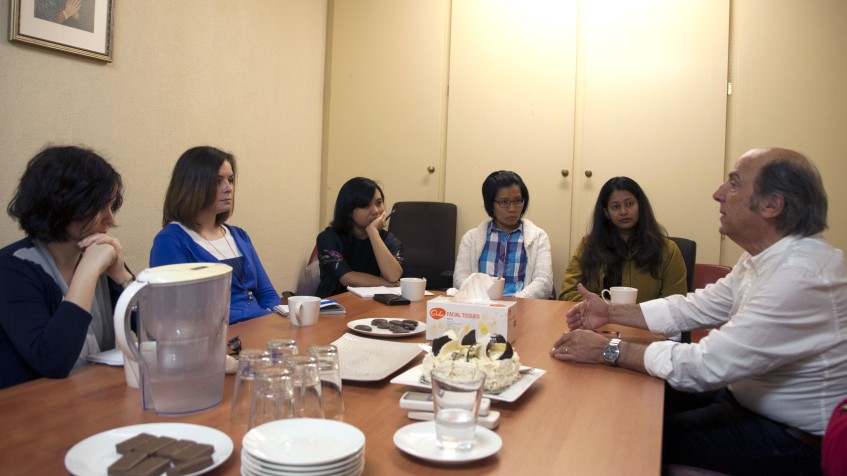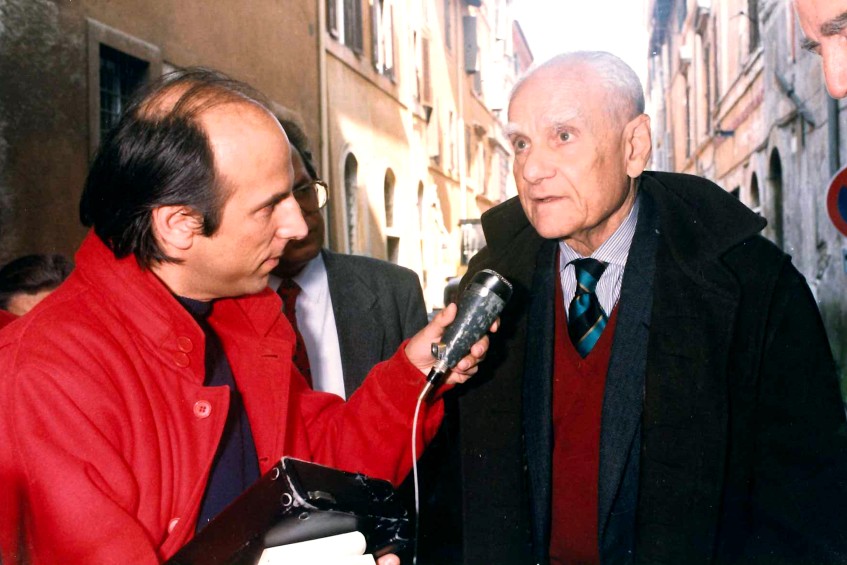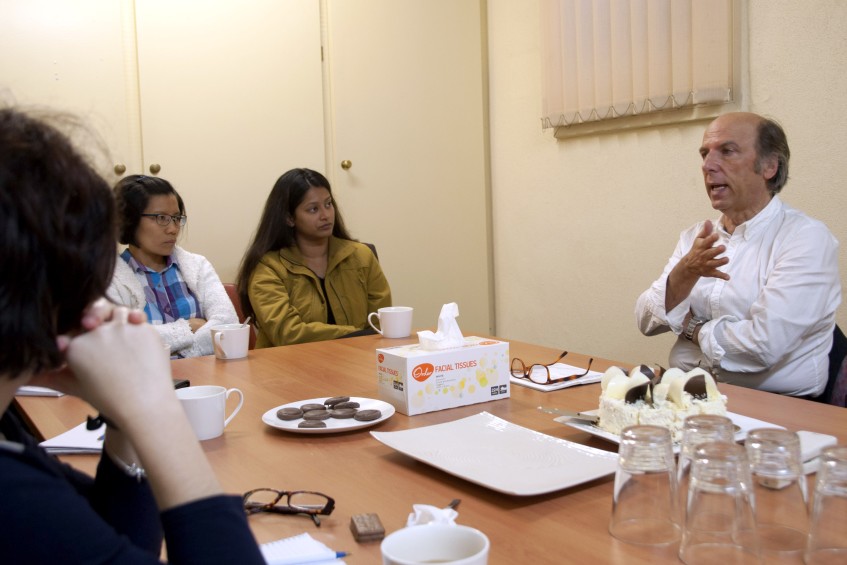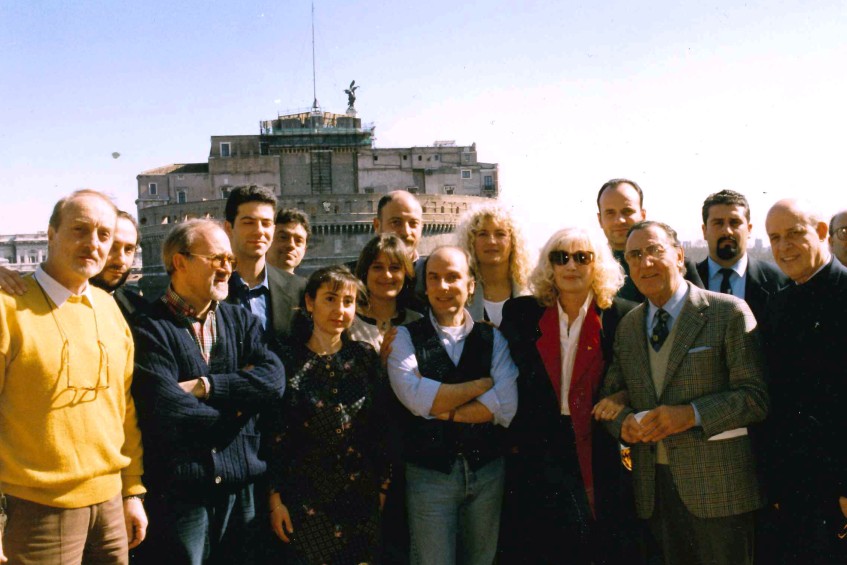Former Chief Editor of Vatican Radio visits Archdiocese of Perth Communications Office

Former Chief Editor of Vatican Radio, Francesco Ceccarelli, visited the Archdiocese of Perth Communications Office accompanied by his wife, Carla, on 5 May 2016 for the World Communications Day 2016. Photo: Marco Ceccarelli
By Staff Writers
Delivering news not first, but better – for me, this was the Vatican Radio.
With these words, former Chief Editor of Vatican Radio, Francesco Ceccarelli, described the atmosphere which he lived and breathed for more than 12 years as a journalist for one of the most renowned Catholic news agencies in the world.
The father of six, who is originally from Rome, last week visited the Communications Office of the Archdiocese of Perth as a guest speaker in view of the 2016 World Communications Day, which Pope Francis announced would take place on 8 May 2016.
The informal event gave the Communications team a rare insight into the operative processes of Catholic journalism at its highest levels during the 1980s and early 90s – years defined by the Cold War, the collapse of the Berlin wall and the Papacy of now St John Paul II.
Basing his talk on the mantra of not aiming to deliver news first but on working hard to offer “better” news, Mr Ceccarelli drew on some of the highlights of his years at Vatican Radio, which included following Pope John Paul II on trips within Europe and Africa and running a newly established evening radio program that dealt with international politics, current affairs, culture, music and entertainment.
The program, Mr Ceccarelli explained, was among the first within the Vatican Radio to give significant attention to international news while retaining a focus on the Pope and the Vatican – a move which contributed to a greater unification of the Church on a global scale.

Former Chief Editor of Vatican Radio Francesco Ceccarelli during an interview with renowned Italian novelist and journalist Alberto Moravia. Photo: Supplied.
“Particularly during the time of Iron Curtain, when Europe was divided into East and West, the Vatican Radio, which communicates in more than 40 languages, was a means through which people from the East could be informed about Catholic news,” Mr Ceccarelli said.
“The Vatican radio, therefore, played a very important role during this time. It was something that, you could say, broke through the Iron Curtain and brought the message of the Pope to the whole world.”
Explaining that the limited resources available did not allow his team to be the first to broadcast news, Mr Ceccarelli explained how they would ensure that their news was of high quality and, more importantly, focused on the dignity of the human person.
“When we were thinking of doing a report on someone, the first thing we did was place the dignity of that person at the centre. Not all the press did this. But Catholic journalism is very much interested the dignity of the person.
“This is one of the central points of the profession of Catholic journalism. It was only by putting the person at the centre of the news that something “better” would come out. This was certainly the principle by which I stood for so many years.”
Mr Ceccarelli referred to the role of the Catholic journalist as honourable and as one that aims to give “a voice to the voiceless; for this, it is such a rewarding job”.

Mr Ceccarelli spoke fondly of his time at the Vatican Radio and of the opportunities he had to follow now St Pope John Paul II on his trips within Europe and Africa. Photo: Jamie O’Brien
Looking back at his coverage of St Pope John Paul II’s international trips, Mr Ceccarelli recalled with fondness the excitement and privilege of following a man as great as Karol Wojtyla.
“What I remember the most, apart from the opportunity to travel and see the world, was that I worked and filled myself with noble things. The speeches of the Pope reflected a noble way of thinking. Writing stories on such speeches allowed me to navigate through this beautiful way of thinking and expressing life.”

Due to its credibility, the Vatican Radio would often be visited by celebrities. Surrounded by his colleagues, Former Chief Editor of Vatican Radio Francesco Ceccarelli (centre) is pictured with Italian actress Monica Vitti and actor Alberto Sordi standing to his left. Castel Sant’Angelo can be seen in the background. Photo: Supplied.
To conclude, Mr Ceccarelli commented on the significant changes that have taken place in Catholic journalism between then and now, particularly with the advent of technology and the internet.
“Things were very different at the time. We did not have the technology of today which offers speed and convenience. Our recorders alone weighed in excess of ten kilos and press releases would be obtained from a large printing machine which constantly turned out news,” he said.
“Today’s means of communication open up new, extraordinary ways of sharing of information. There is much that Catholic communication can offer to the digital age in terms of sharing information that values the dignity of each human being.”
Pope Francis’ Message for the 50th World Communications Day can be viewed by Clicking Here.
